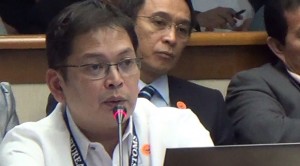‘Smuggling rampant despite reforms’
MANILA, Philippines—More than six months after the government instituted reforms in the Bureau of Customs (BOC), smuggling is still “rampant” at an undisclosed number of ports nationwide.
Customs Commissioner John Phillip Sevilla admitted as much during a recent meeting with businessmen and other customs stakeholders at the Development Bank of the Philippines in Makati City.
“Admittedly, there is still rampant smuggling,” Sevilla said, as he noted that “a problem of trust against the bureau exists, which is something that needs to be fixed.”
Sevilla, former undersecretary for privatization at the Department of Finance, said BOC officials had to deal with “systems that don’t work and where processes are still done manually, a working environment that’s inefficient and something that makes it easy for corruption.”
Sevilla said they were holding some customs personnel accountable “because none of that corruption will happen (if there were no insiders) who were helping to make it happen.”
The bureau, he said, has filed administrative cases against at least 82 customs personnel in the past four months.
“Interestingly, all evidence used to file complaints against them were found using our IT systems. We’re mining the same systems to find evidence of misdeeds against erring personnel,” he said.
At the same time, the customs chief said they were “doing everything to eliminate the discretion being practiced by our examiners in cases of undervaluation or misdeclaration of imported goods.”
“We continue to review the processes to make it as clear as possible. Ideally, examiners should not have to make the decisions. They should just process (the fully electronic processing of customs transactions),” he explained.
Several systems
According to Sevilla, there were several systems that should have been in place at customs, including a “single, organized and reliable database for valuation references.” However, they were not yet in place. He did not elaborate.
The bureau also does not have reliable “data on the growth of customs revenues compared with what’s going on in the Philippine economy.”
“We cannot link our collections to the underlying trends in the economy,” he said.
Last month, Sevilla reported that the bureau’s reform program was “moving forward” with projects like ports rationalization, better coordination between the BOC and the Bureau of Internal Revenue, adoption of best international customs practices, implementation of the agency’s international commitments, and updating the outdated Tariff and Customs Code of the Philippines.
The project calls for, among other things, “uprooting corruption by rebooting customs.”
The agency noted that a “long history of backroom deals, institutionalized theft and impunity have made the bureau one of the most prominent faces of corruption in government.”
However, it said, “this is beginning to change with drastic shifts in leadership, personnel and processes already taking place.”
